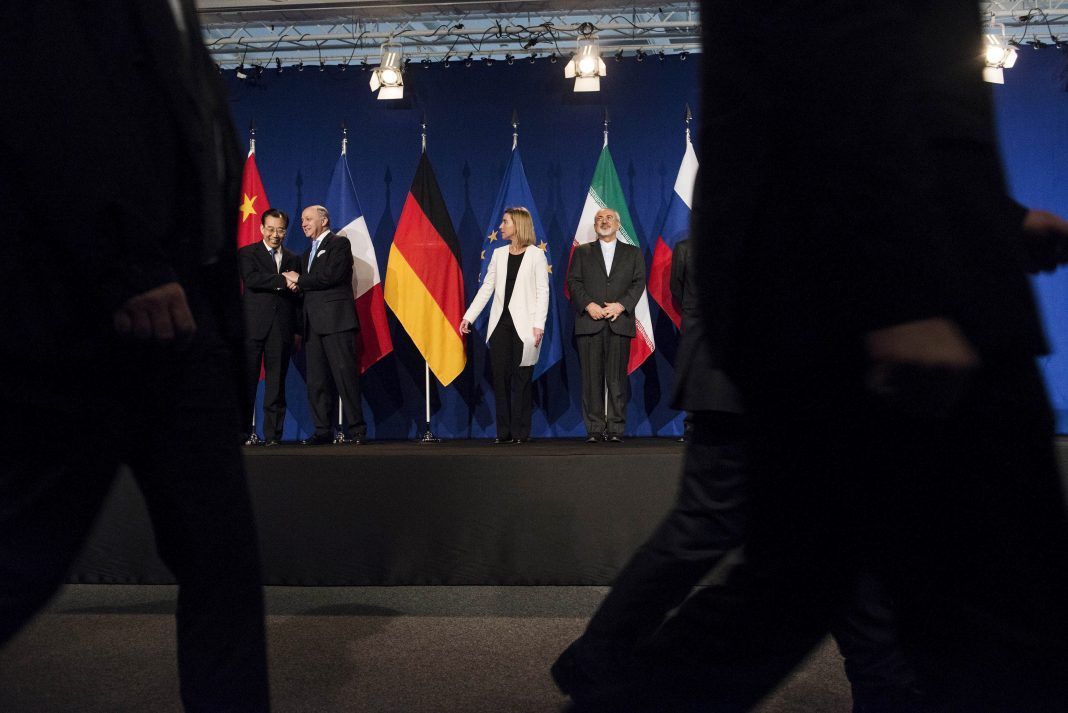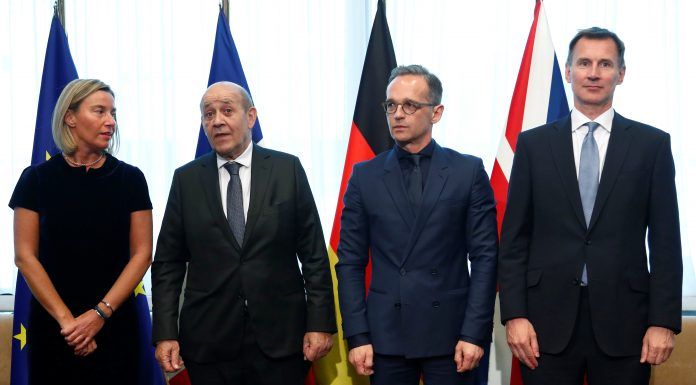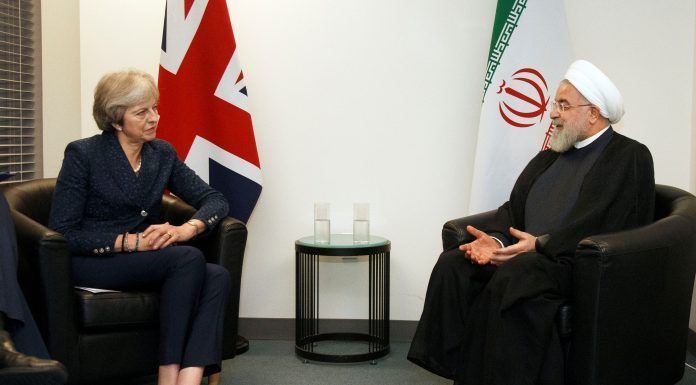The 2015 Joint Comprehensive Plan of Action (JCPOA) nuclear deal marked its four-year anniversary on 14 July but while its future hangs in the balance some analysts say the deal could be reestablished, along with global peace and security.
The JCPOA came into effect to give Iran sanctions relief in return for restrictions on its nuclear programs. U.S. President Donald Trump pulled out of the agreement last year and reimposed sanctions on Iran as part of a Maximum Pressure Campaign to alter the Iranian government’s behavior. The Islamic Republic responded by enriching its uranium over and above the limits set down in the JCPOA and threatened to flout further commitments laid out in the deal.
France, Germany and the U.K. (E3), issued a joint statement on 14 July re-affirming their commitment to the JCPOA as tensions escalated between Washington and Tehran, calling the deal an important factor in ensuring security in the Middle East. However, the E3 also expressed concern over Iranian officials’ decision to breach the terms of the nuclear deal, and the ongoing attacks in the Persian Gulf which have targeted ships, pipelines and drones.
Iran’s Foreign Minister Javad Zarif showed his frustration with the E3’s efforts to find a way around the sanctions, accusing the European countries of failing to carry out their commitments under the deal in an interview with Bloomberg News.
As part of a plan to facilitate trade with Iran, European countries launched INSTEX, a special purpose vehicle allowing Iran to trade with Europe. The instrument conducted its first transactions with the Special Trade & Finance Institute (STFI), its Iranian counterpart, at the beginning of July. Russia subsequently expressed an interest in trading through INSTEX, which was well received by European powers.
While the recent transactions were hailed by analysts as a step forward, the trading facility is unlikely to match dollar trades or garner significant European interest, as companies remain fearful of the impact that U.S. sanctions could have on their businesses.
Borzou Daragahi, a senior fellow at the Atlantic Council in Washington and International Correspondent for The Independent, outlined other problems with the deal in an interview with Kayhan Life. “Realistically, the French and British governments aren’t going to push back against the sanctions,” he said. “Many companies in France and the U.K. also have assets in the United States that could be subject to sanctions.”
“We also have to remember that the EU is distracted by its own internal problems like Brexit and the rise of far right movements across European countries.The deal is not at the top of its agenda at the moment,” he noted.
Heinz Gärtner, a political scientist at the International Institute for Peace (IIP) in Vienna, said Iran could support European efforts to salvage the JCPOA by creating an accord outside of the deal tackling Iran’s missile program, combined with confidence building measures like the exchange of military information between participating states. Gärtner also suggested that Iran could join the Central Asian Nuclear Weapon-Free Zone (CANWFZ) treaty with a provision that the U.S. ratified treaty protocol which provides assurances not to attack or threaten to attack parties in the zone with nuclear weapons.
Outgoing British Prime Minister Theresa May used her last major speech to call on world powers to protect the nuclear deal and “prevent Iran from acquiring a nuclear weapon and to preserve the stability of the region.”
However, Washington hopes its Maximum Pressure Campaign will put an end to the JCPOA and lead to the Iranian government capitulating to its 12 demands, which U.S. Secretary of State Mike Pompeo outlined in May last year. The Trump administration also hopes that it can broker a new deal which includes a wider range of issues including Iran’s nuclear and missile programs, regional behavior and ongoing arrests of dual nationals.
Iran was quick to dismiss claims that it was prepared to talk about at least one of these issues — its ballistic missile program — after Pompeo suggested that Iran had signaled it was prepared to negotiate on it, making the chances of resurrecting the nuclear deal slim.
Daragahi said a more feasible deal existed, which would also be acceptable to the Iranian government.
“We could start with a settlement on Yemen. Deal with the human disasters first and then tackle Iran’s nuclear and missile programs afterwards. Once that calms down, guarantees for Sunnis in Iraq, then a quadripartite settlement, including Iran, the U.S., the Taliban, Russia, India and so on, for Afghanistan. Then the temperature would start to cool down,” he explained.
“The next step could be engaging the Saudis and the Iranians in a U.S. brokered deal, looking at missiles, weaponry, and get to the root of those problems. At that point once the temperature has been reduced further, other issues relating to nuclear and missile programs would fall by the wayside. Furthermore, if sanctions were lifted and U.S. troops pulled out of the region, I think Iran would accept these changes,” Daragahi said.
[aesop_content color=”#ffffff” background=”#333333″ columns=”1″ position=”none” imgrepeat=”no-repeat” disable_bgshading=”off” floaterposition=”left” floaterdirection=”up” revealfx=”off” overlay_revealfx=”off” aesop-generator-content=”The following are excerpts from an interview with Borzou Daragahi.
“]The following are excerpts from an interview with Borzou Daragahi.[/aesop_content]
What are the JCPOA nuclear deal’s strengths?
It created a ground for diplomacy between the U.S. and Iran. That was the main thing, as it enabled communication between these adversaries. We also have to remember where then U.S. President Barack Obama was coming from at the time. Obama came in after the Iraq war and was determined, sometimes to a fault in the opinion of many people, to stop America’s addiction to these Middle East wars. He wanted to use Iran to create a model for reinvigorating the spirit of the U.S. as a diplomatic power rather than just a military power. In a way the JCPOA was a triumph of diplomacy. That was the strength of it, reemphasizing diplomacy as a tool in the U.S. national security quiver of arrows.
What are the deal’s weaknesses?
According to critics, the terms of the JCPOA were not being broad enough, as they did not include other aspects of disagreement felt by the United States, and the time limits on some of the restrictions with regard to enrichment within the deal were also contested. However, Iran would have never signed on to permanent restrictions on anything. No country in their right mind would do so. From Iran’s perspective, weaknesses include limited sanctions relief, and the disinformation spread by people in the Trump administration in Washington, who say that the U.S. gave Iran significant sums of money. But it was actually frozen Iranian money that was repatriated back to Islamic Republic: there were no give-aways. In reality, both Iran and the U.S. expressed dissatisfaction toward the deal, but that’s what negotiation is about, what compromise is about, you are never going to get exactly what you want.
How likely is it that the Iranian government would agree to negotiating on the U.S.’s 12 demands and/or a new deal addressing its nuclear and missile programs, regional behavior and ongoing arrests of dual nationals?
I think it’s very unlikely at this point. By pulling out of the deal the way U.S. President Donald Trump did in such dramatic fashion, he showed himself to be an unreliable partner. Some analysts say he could have had his cake and eaten it by staying in the nuclear deal and then demanding fresh talks on specific issues and alleged violations and trying to pressure the Iranian government to give Trump the better deal that he wants.
The problem is, Trump doesn’t have the patience for that kind of give and take and nuanced diplomacy. He wants a photo opportunity where he’s shaking the Supreme Leader’s hand, or President Hassan Rouhani’s hand and making a deal, using that to say, look I got a better deal than Obama— even though it would not be a better deal that what Obama was able to negotiate— and then trying to use that moment as a foreign policy victory to bolster his campaign in the 2020 presidential election.
Anyone who understands the Iranian government knows that there’s no way that moment could transpire. Rouhani wouldn’t even meet with Obama. On one occasion, Foreign Minister Javad Zarif shook hands with Obama, but then had to answer to the Iranian parliament for doing so. Trump doesn’t understand how much anti-American sentiment there is within the Islamic Republic’s government, so things aren’t going to happen the way Trump wants it to happen.
As far as Pompeo’s demands go, there was a point in the 2000s when the Iranian government was prepared to talk about all these issues and make a more comprehensive deal. It was the U.S. that said no, let’s just focus on the nuclear issue for now. So I think that Iran in theory would be open to a wider agreement that included missiles and support for regional militia, but not under circumstances where the Iranian government is being belittled and not in the way the Trump administration is communicating. Iran’s Supreme Leader likes to do things behind the scenes, and is a very secretive person in that sense, so he’s not going to agree to the kind of Hollywood reality television version of diplomacy that Trump seems to envision.
How could the JCPOA be saved?
The solution is very simple. The EU could buy 2 million barrels of oil from Iran per day. That would preserve the nuclear deal, but the move would require the EU to stand up to the U.S. In other words, put your money where your mouth is. If the EU supports the nuclear deal, it has to be serious in its efforts. If the EU is concerned about U.S. sanctions, it could pass a law saying that it’s illegal to adhere to U.S. sanctions. But realistically, is the French government going to do that to French super-major oil company Total? No. Is the British government going to do that to British Petroleum? I don’t think so. Many of these companies have assets in the United States that could be subject to sanctions but the EU could come up with some kind of mechanism to protect these companies. The EU could create a European wide energy company for example which could purchase Iranian oil.
This could happen, but there’s only a slim chance, as the EU is distracted by its own internal problems like Brexit and the rise of far right movements across European countries.The deal is not at the top of its agenda at the moment.
Does a better, or more feasible deal exist and if so what might that deal’s terms look like?
It’s so hard to do this and there are so many moving parts. However, my suggestion is that we could start with a settlement on Yemen. That would be an easier place to start than perhaps looking at Syria, which is much more complicated. Deal with the human disasters first and then tackle Iran’s nuclear and missile programs afterwards. Once that calms down, guarantees for Sunnis in Iraq, then a quadripartite settlement, including Iran, the U.S., the Taliban, Russia, India and so on, for Afghanistan. Then the temperature would start to cool down.
The next step could be engaging the Saudis and the Iranians in a U.S. brokered deal, looking at missiles, weaponry, and get to the root of those problems. At that point once the temperature has been reduced further, other issues relating to nuclear and missile programs would fall by the wayside. Furthermore, if sanctions were lifted and U.S. troops pulled out of the region, I think Iran would accept these changes.
| [amo_member id=”110708″ item-width=”250″ align=”left” item-margin=”20″ full-width=”yes” panel=”right”] |




